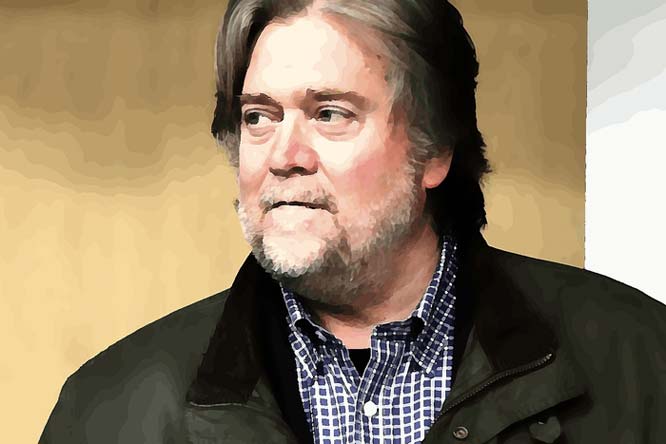
President Donald Trump's fiery denunciation of Steve Bannon on Wednesday was followed by a more subdued, yet more threatening, letter in which a Trump attorney accused the president's former campaign chief of violating a nondisclosure agreement by participating in a new book by journalist Michael Wolff.
"You have breached the agreement by, among other things, communicating with author Michael Wolff about Mr. Trump, his family members, and the company, disclosing confidential information to Mr. Wolff, and making disparaging statements and in some cases outright defamatory statements to Mr. Wolff about Mr. Trump, his family members, and the company," lawyer Charles Harder wrote, raising the specter of a lawsuit.
A copy of the document Bannon signed has not become public, but former Trump campaign adviser Michael Caputo said Thursday on Fox News that everyone who worked on the campaign signed the same contract.
"All of us who wanted to work for the campaign - even volunteers - were signing this nondisclosure, nondisparagement agreement," Caputo said.
Thus it seems likely that the document Bannon signed is similar, if not identical, to the one signed by former campaign aide Sam Nunberg. Nunberg's is public because it was an exhibit in a 2016 lawsuit brought by Trump, who accused Nunberg of breaching the contract in much the same way that he now claims Bannon did.
The contract does not bar former aides from writing or participating in books, period - former Trump campaign manager Corey Lewandowski and deputy manager David Bossie already have, and former White House spokesman Sean Spicer is working on one - but it does prohibit the sharing of confidential information or public disparagement.
Harder's letter appears to refer to this portion of the NDA:
"During the term of your service and at all times thereafter, you hereby promise and agree not to demean or disparage publicly the company, Mr. Trump, any Trump company, any family member, or any family member company."
Bannon clearly did disparage Trump family members. He told Wolff that Ivanka Trump is "dumb as a brick" and that Donald Trump Jr.'s 2016 meeting with a Kremlin-linked attorney was "treasonous" and "unpatriotic."
Could the president actually win a lawsuit, based on such criticisms?
As I have written in the past, the bar is high in defamation suits, particularly for public figures such as the Trumps. Bannon's opinions, however unflattering, would not constitute defamation.
Alternatively, Trump could sue Bannon for breach of contract. When Lewandowski joined CNN in the summer of 2016, I asked attorney Alan Hyde whether a nondisparagement clause could stop an ex-aide from making critical statements.
"It's very hard to think of a scenario under which it is enforceable," said Hyde, an employment-law specialist at the Rutgers University School of Law. "It's mostly there to be cautionary."
The problem for Trump, Hyde told me, is that "contract suits have to allege economic damage. They have to allege a breach of a promise, and then you have to show the breach of that promise caused the plaintiff to suffer some economic damage - and you have to prove it with certainty. It would be impossible, plausibly, to show that any particular criticism of Trump cost him."
Retired attorney Anne Golden, an expert in employment law, offered similar analysis on Thursday.
"A lot depends on the wording of the NDA, but it also depends on the stated penalty for any violation," she said, adding that contract laws vary from state to state. "It appears that Bannon did violate the prohibition, but any liquidated damages provision may be unenforceable, especially if Trump can't prove any actual damages, including reputational, directly resulting from the violation."
In the Nunberg case, we never found out whether Trump's NDA would hold up in court because Nunberg counter-sued and ultimately reached a settlement with Trump, the details of which are unknown. We might not find out in Bannon's case, either, since Trump has a habit of backing down after threatening legal action.


 Contact The Editor
Contact The Editor
 Articles By This Author
Articles By This Author